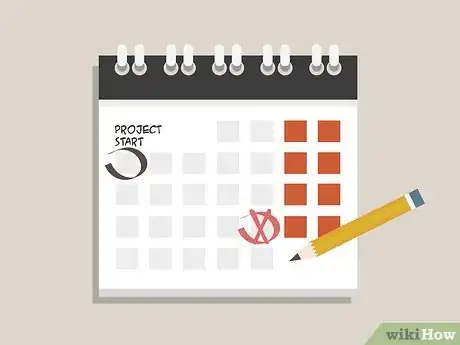This article was co-authored by Shannon O'Brien, MA, EdM. Shannon O'Brien is the Founder and Principal Advisor of Whole U. (a career and life strategy consultancy based in Boston, MA). Through advising, workshops and e-learning Whole U. empowers people to pursue their life's work and live a balanced, purposeful life. Shannon has been ranked as the #1 Career Coach and #1 Life Coach in Boston, MA by Yelp reviewers. She has been featured on Boston.com, Boldfacers, and the UR Business Network. She received a Master's of Technology, Innovation, & Education from Harvard University.
There are 8 references cited in this article, which can be found at the bottom of the page.
This article has been viewed 14,793 times.
Social loafing is a phenomenon where people in groups don’t work as diligently on a task as they would if they worked alone. This can be a big problem in workplaces and classrooms, but there are many ways to minimize it. Whether you’re a manager, teacher, or a member of a group, you can try a few strategies to cut down on social loafing and keep everyone motivated until the project is completed efficiently.
Steps
Constructing Effective Groups
-
1Build a team of people who you know work well together. Group cohesion is a major factor in reducing social loafing. If possible, recruit people who are friendly with each other, work hard, and are good at their jobs. Right from the start, you’ll have a team that’s set up for success.[1]
- If you’re a teacher, try letting the students pick their own groups. Students who are friendly with each other will naturally join together and the group will be more cohesive. Remember that you may have to intervene so no students feel left out.
- If you’re a manager, try observing the workplace for a few days. See who gets along and works hard. Use that information to build your team.
- If your boss tells you to form a team to solve a problem, choose people in the office that you get along with. You'll have a more cohesive group to work with.
-
2Limit the number of poorer performers if you have to include them. Unfortunately, you don’t always have a choice on who you can recruit for your team. If you have to include employees or students who don't work as hard as others, try to dilute their influence. Mix them in with a group of hard workers so the project still goes smoothly.[2]
- Try to mix groups up to prevent hard workers from doing all the work in a group. In a group of 3 lower-performing workers and 1 hard worker, the hard worker will probably do all the work. As a result, they’ll be unhappy and might resent the person who put the team together and/or their teammates.
Advertisement -
3Cap groups at 4-5 members so no one hide in the crowd. Social loafing increases in larger groups. Each individual member feels less responsible for the tasks at hand, and therefore doesn’t work as hard. The ideal group size is 4-5. This is enough members to divide work fairly, but not so many that members can slack off without contributing.[3]
- To keep the team small but effective, try recruiting people with diverse skills. For example, with one member good at accounting, one good at organization, one skilled presenter, and one natural leader, you’ll have a small but well-rounded team for the task.
- This is especially important for teachers as well. Large groups of students will start chatting and get distracted from the task.
-
4Break the team into subgroups if reducing the team size isn’t an option. Unfortunately, you may not have a choice for limiting your group size. In this case, you can still work around the limitation by breaking the group down further. Assign particular subgroups to handle specific tasks. This way, the members will all technically be on the same team but they’ll be working in different areas and less likely to loaf around.[4]
- If you're not in charge of the team, try suggesting breaking up the tasks like this. Tell the team that it'll make sure no one has too much work to do, which can help convince others to support your suggestion.
- Remember to organize the team so any unmotivated workers don’t end up all responsible for one task. That task might not get done.
Setting Team Guidelines and Expectations
-
1Set clear goals so the group knows what’s expected of them. Ambiguous tasks increase social loafing because team members aren’t sure what the expectations are. When you construct a team, always start by outlining the task clearly and what you expect of them. This way, the team gets started on the right foot.[5]
- Always stop and ask if anyone is unsure about what the goals are. Explain the task again if you have to.
- If necessary, print out a list or worksheet of the task and subtasks of the project. Make sure each team member receives and understands this list. This is especially helpful for teachers so their students understand the assignment.
- If the manager or boss didn't outline clear goals, you can still take that step. Suggest that the group outlines how it will achieve the assignment to get more organized.
- Make sure the goals are manageable as well. Unreasonable tasks increase social loafing because team members will feel like working towards an impossible goal is pointless. If necessary, break the tasks down further so they seem more attainable.
-
2Give each team member a specific task so they feel more responsibility. A large, impersonal task could make individual team members feel less invested in the project. Breaking the project up and assigning each team member a smaller task makes them feel responsible for that individual part. As a result, they’ll feel more motivated to accomplish their part.[6]
- Giving each team member an individual task also makes it harder for them to hide in the crowd because you’ll know who was responsible if that task isn’t completed. This might motivate a person who otherwise tends to slack off.
- If you have a diverse team with different skillsets, try assigning people to tasks you know they’re good at. This is another motivator for good work.
- You can also make this suggestion if you aren't in charge of the group. Others might think the same way and prefer to handle their own specific tasks.
- In a classroom setting, giving students individual grades for their part of the project is a good motivator. That way, they can work without worrying that a student who slacks on the team will ruin their grade.
-
3Give the group a firm deadline so they stay on task. Part of setting firm expectations is giving the team a hard deadline for the project. Don’t be ambiguous on the due date, or the group is more likely to slack. State firmly that you expect the project completed on a particular date.[7]
- Don’t make the deadline too far in the future. If you set a deadline for next year, the group is likely to procrastinate. If this is a long-term project, set short-term milestones instead. Having a milestone deadline every 1 or 2 months will keep the group on task.
- Follow through with the deadlines you set. If you have a habit of setting deadlines and not asking the team for its results on that date, then you’ve set a precedent that your team is allowed to miss deadlines.
-
4Explain the importance of the task at hand. Team members tend to work harder on tasks that they think are important. Motivate the team by showing them that their work is important, and the final results will be very valuable to the company, workplace, or classroom.[8]
- For a team at work, explain what the fallout will be if the team fails. For example, if they’re putting together a proposal to get a construction contract, tell them that this quarter’s earnings are dependent on getting that contract.
- For students, explaining how much their grade is riding on this project can be a motivator. Making a project worth 1/3 of their final grade, for instance, could motivate even lazier students to work harder for the grade.
- Even if a task is not the most important thing in the world, try to frame it as something that interests all the team members. Explain that organizing the office will make everyone’s job easier, for example.
-
5Keep the lines of communication open between yourself and the team. Don’t make the team and then forget about it. Make sure each team member can reach you at any time to talk about problems or suggestions. This keeps the team more cohesive and shows good leadership skills on your part.[9]
- Don’t act as if people are bothering you when they reach out to you. Welcome their input.
- Making employees or students feel like they can always talk to you without judgment is a good policy overall. They’ll be more likely to bring problems to your attention or ask for guidance if they need it.
- If you're on a team and have concerns, don't hesitate to reach out to the manager or teacher for guidance.
Keeping Team Members Motivated and Accountable
-
1Check in with the group so they know they’re being supervised. If you’re an absentee manager, workers might feel like they can hide. Instead, touch base with the team on a regular basis so they know you’re observing. That way, they’ll know you won’t let them loaf on the project.[10]
- A regular, in-person meeting is a good way to keep the team accountable. Set a weekly or monthly meeting to check-in and see how the project is going.
- Remember to avoid micro-managing. This reduces the team’s motivation. Just check in so you know how things are going, then leave the team to work.
-
2Recognize and praise individual team members for their efforts. Positive reinforcement goes a long way to motivating a group. If a particular team member does a good job on their task, thank them personally for it.[11] Knowing that you notice their efforts will help motivate them more in the future.[12]
- In periodic meetings, try bringing a little attention to team members who accomplished certain tasks. For example, say, “Let’s all look at this report here, which I understand Judy put together. Thank you, Judy, this is very comprehensive.”
- This works if you're a team member too. Give out compliments to your teammates to bring attention to their good work.
- If a team member is struggling, try complimenting a small task they carried out. A simple “Thanks for getting back to me so quickly, that made my job a lot easier” shows your appreciation for a small accomplishment that could improve the person’s work overall.
-
3Send out reminders to each team member to accomplish their tasks. This is another way to show your team that you’re monitoring their progress. When a deadline is approaching, send an email to the team reminding them. This keeps them on task and lets them know that you’re on top of the project.[13]
- Unless there are problems, don’t make this email sound threatening. A quick message like “Just wanted to remind you all that I’m expecting to see your results next Wednesday. I’m really looking forward to seeing your work” makes the message sound much more encouraging.
- If team members have individual tasks, send them personal emails instead of group ones. Remind them that their specific task is due and you’re looking forward to seeing it.
-
4Speak with people who underperform so they don't influence the team. Loafing can be contagious. If team members see someone getting away with loafing all the time, then they’re more likely to slack on their own work, which drags the entire team down. If you see anyone slacking or failing to produce results during your check-ins with the team, speak with them right away. Tell them their performance is not what you expected, and they’ll have to put more effort in. When the other team members see that you deal with inefficient workers promptly, they’ll be more motivated to work.[14]
- Make the conversation lighthearted at first. Just remind the person that you’re expecting better work and you know they can perform better. This light reminder is enough for most people. Only get firmer if the problems continue.
-
5Use peer evaluations where group members can assess each other’s’ performance. When a project is completed, consider handing out a survey where team members can assess how the team performed. Have a section for complaints or problems that the team ran into. This way, you can see if there are any problems that require your attention, and team members will feel more accountable if they’ll be graded poorly for slacking off.[15]
- In a classroom setting, you could have team members give out hypothetical grades to their group mates for their performance.
- Make these evaluations anonymous. It could lead to tension in the classroom or workplace if people know that their teammates were speaking badly about them.
References
- ↑ https://business.siu.edu/news/2015/012901.html
- ↑ https://business.siu.edu/news/2015/012901.html
- ↑ https://hbr.org/2012/08/why-less-is-more-in-teams
- ↑ https://hbr.org/2012/08/why-less-is-more-in-teams
- ↑ https://www.forbes.com/sites/kareanderson/2014/07/24/what-to-do-with-a-loafer-on-your-team/#1c79dd756730
- ↑ https://globaljournals.org/GJHSS_Volume14/2-Some-Strategies-for-Reducing.pdf
- ↑ https://www.blackenterprise.com/3-steps-discourage-stop-social-loafing-team-building-leadership-tips/
- ↑ https://business.siu.edu/news/2015/012901.html
- ↑ https://www.forbes.com/sites/kareanderson/2014/07/24/what-to-do-with-a-loafer-on-your-team/#1c79dd756730
- ↑ https://magazine.business.wfu.edu/2016/08/03/social-loafing-its-impact-on-team-projects/
- ↑ Shannon O'Brien, MA, EdM. Life & Career Coach. Expert Interview. 25 May 2021.
- ↑ https://magazine.business.wfu.edu/2016/08/03/social-loafing-its-impact-on-team-projects/
- ↑ https://www.forbes.com/sites/kareanderson/2014/07/24/what-to-do-with-a-loafer-on-your-team/#1c79dd756730
- ↑ https://www.researchgate.net/publication/320609850_Managerial_solutions_to_reduce_social_loafing_in_group_activities_of_companies
- ↑ https://globaljournals.org/GJHSS_Volume14/2-Some-Strategies-for-Reducing.pdf









































































